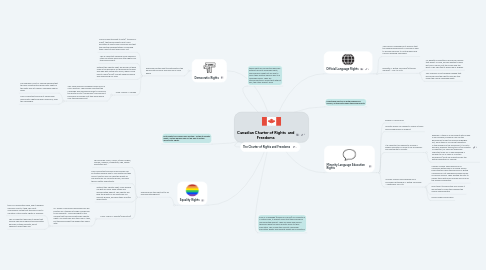
1. Democratic Rights
1.1. Everyone has the right to participate in the democratic process and have your voice heard.
1.1.1. This includes the right to vote ( 18 years or older), that governments must hold elections at least every five years and that the elected representatives comprising them meet at least every year. ect.
1.1.2. This is important because many people in other countries have very little rights over their government.
1.1.3. Without this charter right, we would not have a say in the decisions our government makes and who gets voted into office, which could lead to many (more) corrupt people running and influencing our lives.
1.1.4. Case: Harper V Canada
1.1.4.1. This Case involved campaign finances for a 2004 election. The problem was that the campaign was spending money to influence the political vote ( refrendum) This wouldn't have been a problem but they were going over the spending limit
1.1.4.1.1. The supreme court of Canada decided that this was violating the democratic rights of the party and let Harper's campaign spend away.
1.1.4.1.2. This is important because it shows how democratic rights are given everyone, even the campaigns
2. Equality Rights
2.1. Everyone has the right not to be discriminated against.
2.1.1. This includes: Race, Colour, Ethnic Origins, Gender, Religion, Disabilities, Age, sexual orientation ect.
2.1.2. This is important because many people can be treated unfairly due to circumstances they cannot control.This can help the quality of life drastically for minority groups, and give them a better opportunity.
2.1.3. Without this Charter right, many people can get off easily while others are discriminated against. This charter will help the quality of life drastically for minority groups, and give them a better opportunity.
2.1.4. Case: Vriend V Alberta (Edmonton)
2.1.4.1. Mr. Dlewin Vriend was dismissed from his position as a teacher at Kings college due to his sexuality. Vriend brought to the surface that this was violating his charter rights. He eventually won the case in 1994, but the government the appeal two years later.
2.1.4.1.1. this is a complicated case, and it reached supreme court in 1998. The court unanimously voted that this was in fact a violation of the charter rights of freedom.
2.1.4.1.2. This is important because it shows that nobody should be against discriminated because of their sexuality, and it shouldn't effect their job.
3. both rights tie in which one another. Without equality rights, certain people may not be able to obtain democratic rights.
4. these rights are connected because without minority language rights, some people might not be able to voice their political opinion due to a language barrier. They are interconnected in a way that without one, the other doesn't work
5. Even if a language (English or French) is a minority in a certain area, it doesn't mean that they should be discriminated against. They are equal and should therefore have the same priority given to their education. This is how the Minority Language Education Rights and Equality Rights are connected.
6. The Charter of Rights and Freedoms
7. Everything must be in both English and French, as they both share the same priority.
8. Minority Language Education Rights
8.1. English + French only
8.2. Minority group can request a school if there are enough people in support
8.3. It is important for people to receive a proper education in order to be successful and contribute to society
8.3.1. Example: If there is a monument with a label in only English, someone can sue the government under the official languages act, since there is no french translation. In the example of the monument, it is not a big deal, however this section of the Charter is important, as services (especially important ones ex. A sign explaining a number to call in case of a certain emergency) must be understood by the entire population of Canada.
8.4. “Conseil scolaire francophone de la Colombie-Britannique v. British Columbia” - September 26 2019
8.4.1. Conseil scolaire francophone de la Colombie-Britannique is a french school board that accused the province of British Columbia for not spending enough money on french schools. They wanted the city to supply them with more money and fix all of the school’s properties.
8.4.2. Didn’t want to spend the 300 million it would take to make the changes the school board wanted
8.4.3. French school board won
9. Official Language Rights
9.1. The Official Languages Act ensures that the federal government of Canada is able to provide services to both English and French-speaking Canadians.
9.2. Bessette v. British Columbia (Attorney General) - May 16 2019
9.2.1. Mr. Besette committed a provincial offence that wasn’t a crime, and he wanted to have his trial in French, but the crown and the gov’t of BC said that it should be in English.
9.2.2. The Supreme Court however agreed that he should have the right to have his trial under the official language rights
